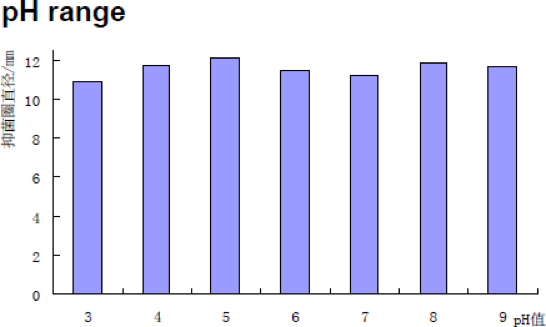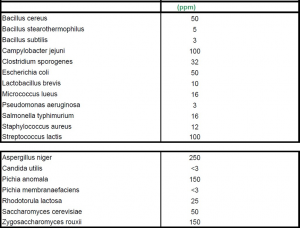What is Epsilon Poly L Lysine?
Epsilon Poly L Lysine (ε-Polylysine) is a natural food preservative and high-efficiency antimicrobial agent manufactured from a fermentation process using Streptomyces albulus under aerobic conditions. Epsilon poly l lysine (ε-Polylysine) is widely used as food preservative. It can inhibit the growth of Gram-positive and Gram-negative bacteria, yeasts, moulds, bacteria and ect.
ε-Polylysine is also called Epsilon Polylysine, ε-Poly-L-lysine, ε Poly L Lysine, ε-PL, Natural antimicrobial preservative.
Epsilon Poly L Lysine structure
Epsilon Poly L Lysine (ε-Polylysine) is a homopolymer of L-lysine, one of the essential amino acids. It is linked by peptide bond formed with α-carboxyl of L-lysine and ε-azyl from other L-lysine. The chemical formula for Epsilon Poly L Lysine (ε-Polylysine) as follows:

Epsilon Poly L Lysine molecular weight
3200~4500 g/mol (degree of polymerization = 25~35). Epsilon Poly L Lysine (ε-Polylysine) is a naturally produced, cationic homopolymer of 25-35 L-lysine(due to Streptomyces albulus fermentation.), which was connected by ε-amido bond compounded by a ε-amido of l-lysine and a a-carboxyl of another l-lysine.
Epsilon Poly L Lysine synthesis
α-Polylysine is a synthetic polymer, Epsilon Poly L Lysine (ε-Polylysine) fermentated from a fermentation process using Streptomyces albulus under aerobic conditions.
Epsilon Poly L Lysine solution
Usually pure Epsilon Poly L Lysine (ε-Polylysine) is dissolved to 5-10% Epsilon Poly L Lysine (ε-Polylysine) solution with cold boiled water or distilled water, then put it into the food and mix fully when in use.
Epsilon Poly L Lysine (ε-Polylysine) is hygroscopic, light yellow power. It is soluble in water, slightly soluble in ethanol, insoluble in organic solvent such as ethyl acetate, ether, ect.. The molecular of Epsilon Poly L Lysine (ε-Polylysine) is a straight chain polymer of lysine. It can decompose to lysine in human body, and can be completely digested to absorption by the human body. It doesn’t have any poisonous side effects and can be regarded as the source of amino acid lyisine.
Epsilon Poly L Lysine (ε-Polylysine) can inhibit the growth of Gram(+) and Gram(-) bacteria , yeast, mould, virus and ect, especially inhibit the Gram(-) bacteria which can’t be easily inhibited by other preservatives, such as E.coli, Salmonella, and also can inhibit the thermophilics, such as B,stearothermophilus. Its activity is not affected by PH, and stable when heated (120℃ for 20min). Therefore, it can be sterilized along with the raw material. Epsilon Poly L Lysine (ε-Polylysine) is a food preservative which is highly efficient, safe, and has no side-effects.
Physicochemical Property
Epsilon Poly L Lysine (ε-Polylysine) is a a linear polymer of lysine, it is a light yellow powder and is hygroscopic with a slightly bitter taste. The antibacterial activity is not affected by the pH value and stable to heat (120 ℃, 20min), and can inhibit the heat-resistant bacteria. As this result it can be added before heat treatment.
However, Epsilon Poly L Lysine (ε-Polylysine) antibacterial activity may be reduced due to the binding with acidic polysaccharides, hydrochlorides, phosphates, copper ions or others. Epsilon Poly L Lysine (ε-Polylysine) antibacterial activity can be enhanced With hydrochloric acid, citric acid, malic acid, glycine and higher fatty glycerides. Epsilon Poly L Lysine (ε-Polylysine) with a molecular weight between 3600-4300 has the best antibacterial activity. When the molecular weight is less than 1300, Epsilon Poly L Lysine (ε-Polylysine) loses its antibacterial activity. Since Epsilon Poly L Lysine (ε-Polylysine) is a mixture, there is no fixed melting point, and softening decomposition starts at 250 ° C or higher. Epsilon Poly L Lysine (ε-Polylysine) dissolved in water, slightly soluble in ethanol.
Biological Property
(1) Broad antibacterial spectrum: Epsilon Poly L Lysine (ε-Polylysine) has obvious inhibition to gram-positive bacteria and Gram-negative bacteria, yeast, mould, virus and many other microorganism.
(2) Good thermal stability: in high temperature (80℃-60 min, 100℃-30 min and 120℃-20 min), it does not decompose, not inactivation, suitable for cooked food.
(3) Good water-solubility: good water-solubility, it can spread evenly in food; Colorless, odorless and nature, do not affect food flavor.
(4) Wide PH range:Epsilon Poly L Lysine (ε-Polylysine) has broad antibacterial spectrum, the range of PH is between 2 and 9, most common food preservatives have poor antibacterial activity effects in neutral and alkaline conditions.

Epsilon Poly L Lysine inhibition diameter vs pH value

Minimum Inhibitory of Concentration of epsilon-Polylysine for common pathogen and spoilage microorganisms
(5) Strong Blends: it has synergistic effect when blending with potassium sorbet, citric acid, malic acid, glycine and Nisin.
(6) High safety: After eating, it is not accumulated inside human bodies, partly break down into essential amino acid lysine for human body, L–lysine, Non-toxic, known as the “pharmaceutical & nutrient preservatives”
(7) Health function: Recent studies show that Epsilon Poly L Lysine (ε-Polylysine) can inhibit the enzyme activity and the fat absorption in the small intestine ester, has curative effect against with obesity.
Mechanism of antimicrobial action
The antimicrobial mechanism of Epsilon Poly L Lysine (ε-Polylysine) is mainly in the following three aspects:
(1) acting on the cell wall and cell membrane system;
(2) acting on the genetic material or genetic structure of the particle;
(3) act on enzymes or functional proteins. Studies found found that Epsilon Poly L Lysine (ε-Polylysine) not only inhibits the heat-resistant G + micrococcus, but also inhibits G-coli and Salmonella that is not easily inhibited by other natural preservatives (such as Nisin) , and the antibacterial effect is also good. Meanwhile, ε-PL can also inhibit the growth of Lactobacillus bulgaricus, Streptococcus thermophiles and yeast. However, the inhibition of Bacillus subtilis and Aspergillus niger was not obvious when Epsilon Poly L Lysine (ε-Polylysine) was used alone. The inhibition of Bacillus subtilis by Epsilon Poly L Lysine (ε-Polylysine) combined with acetic acid was enhanced. Epsilon Poly L Lysine (ε-Polylysine) still have antibacterial activity on micrococcus after high-temperature treatment.
ε-polylysine Application & use in food preservation
(1) ε-polylysine and glycine used together can prolong the shelf life of milk.
(2) extending shelf life of instant rice and fast foods.
(3) polylysine and garlic used together as the food preservatives. This food preservatives are added to or sprayed on the surface of the food when, which has a significant antibacterial and antiseptic effect and can kill or inhibit the pathogenic microorganisms inside or on the food.
How to use
You can dilute Epsilon Poly L Lysine (ε-Polylysine) to the 5-10% Epsilon Poly L Lysine (ε-Polylysine) solution with cold boiled water or distilled water, then put it into the food and mix fully. If it is used together with other food preservatives, can attain better effect.
Use dosage
ε-Polylysine is widely used as a natural food preservatives, the foods contain ε-Polylysine such as: cake, pastry, snack foods, cookies, butter, salad, sauce, beverage, wine, meat products, boiled rice, cooked vegetables, soups, noodles and etc. The dosage as follows:
| Food categories | Use Level (% w/w) |
| Bakery | |
| Cake batter and cheesecakes | 0.01 |
| Muffins and popovers | 0.01 |
| Pancakes and waffles | 0.025 |
| Pies (not fruit) | 0.025 |
| Sweet pastries | 0.01 – 0.025 |
| Pie fillings | 0.025 |
| Puddings, custards, and mousses | 0.025 |
| Beverage | |
| Alcoholic beverages | 0.01 |
| Wine | 0.005 |
| Eggnog | 0.01 |
| Energy, fitness, sports, and isotonic drinks (ready-to-drink) | 0.025 |
| Gelatin, rice, and sugar cane-based beverages | 0.025 |
| Soft drinks | 0.025 |
| Coffee and coffee beverages | 0.025 |
| Tea and tea beverages | 0.025 |
| Tomato-based juices | 0.025 |
| Nectars | 0.025 |
| Chocolate-flavored drinks | 0.01 |
| Fruit-flavored drinks and ades (ready to eat) | 0.025 |
| Fruit smoothies | 0.025 |
| Confectionary | |
| Sweet syrups and toppings | 0.025 |
| Culinary | |
| Eggs | 0.025 |
| Grain-based dishes | 0.025 |
| Pastas | 0.025 |
| Fat-based sauces | 0.01 |
| Gravy | 0.025 |
| Soups (excluding canned) | 0.025 |
| Egg-based dishes | 0.025 |
| Reduced-fat or fat-free margarine-like spread | 0.005 |
| Salad dressings (regular and low-fat) | 0.025 |
| Peanut butters and sauces | 0.025 |
| Soy products | 0.025 |
| Dairy | |
| Cheese-based mixtures | 0.025 |
| Cottage, ricotta, and cream cheese | 0.025 |
| Feta, mozzarella, and Mexican cheese | 0.025 |
| Processed cheese and cheese spreads | 0.025 |
| Cream substitutes | 0.025 |
| Imitation cheese | 0.025 |
| Cream | 0.01 |
| Sour cream and dips | 0.025 |
| Yogurt | 0.01 |
| Fruits and vegetables | |
| Pickles, olives, and pickled products | 0.025 |
| Dry beans and bean-based prepared foods | 0.025 |
| Potato- and sweet potato-based foods (excluding French fries) | 0.025 |
| Vegetable-based prepared foods | 0.01 – 0.025 |
| Prepared fruit and fruit mixtures | 0.025 |
| Frozen fruit bars and sorbet | 0.025 |
| Meat, poultry and seafoods | |
| Meat substitutes | 0.025 |
| Fish and shellfish-based foods | 0.025 |
| Fish and shellfish | 0.025 |
Market
Market trend
With the market trend toward natural food preservatives still going strong, food manufacturers have focused their efforts in using natural food preservatives in their manufacturing to extend the shelf life of their products.
Epsilon Poly L Lysine (ε-Polylysine) derived naturally from a submerged aerobic fermentation of Streptomyces albulus. With a high antimicrobial activity against fungi, Gram-positive and Gram-negative bacteria,Epsilon Poly L Lysine (ε-Polylysine) is an ideal natural antimicrobial for extending shelf life of a variety of foods to replace the chemical food preservatives.
Epsilon Poly L Lysine (ε-Polylysine) manufacturers
There are several Epsilon Poly L Lysine (ε-Polylysine) manufacturers in China and abroad, as you know, the price of China Epsilon Poly L Lysine (ε-Polylysine) suppliers can be better than abroad manufacturers. We have worked with China top Epsilon Poly L Lysine (ε-Polylysine) manufacturer for years, we would like to recommend this Epsilon Poly L Lysine (ε-Polylysine) brand to you if you would like to save your purchasing cost with the same Epsilon Poly L Lysine (ε-Polylysine) quality compared with abroad Epsilon Poly L Lysine (ε-Polylysine) manufacturers. Epsilon Poly L Lysine (ε-Polylysine) Samples are available if you need it for further test after accept the price.
Epsilon Poly L Lysine (ε-Polylysine) price
Now the price of Epsilon Poly L Lysine (ε-Polylysine) is around USD/kg from China Epsilon Poly L Lysine (ε-Polylysine) manufacturers and suppliers.
Where to buy Epsilon Poly L Lysine (ε-Polylysine)

All the products listed in our website are from the manufacturers we have worked together for many years. The professional working experience backup our confidence to their quality. We sell Epsilon Poly L Lysine (ε-Polylysine) for many years and we can be your Epsilon Poly L Lysine (ε-Polylysine) suppliers in China. If you would like to buy Epsilon Poly L Lysine (ε-Polylysine) or inquiry price for please e-mail us through: info@foodsweeteners.com
Side effects & safety
Epsilon Poly L Lysine (ε-Polylysine) is consider as safe preservative commercially used as a natural food preservative in Japan, the republic of Korea and in the USA. Food products containingEpsilon Poly L Lysine (ε-Polylysine) are also found in Japan. The use ofEpsilon Poly L Lysine (ε-Polylysine) is common in food applications like: boiled rice, cooked vegetables, soups, noodles and sliced fish (sushi).
Approval and regulations
Epsilon Poly L Lysine (ε-Polylysine) is food grade and meets FAO/WHO specifications. It is certified as GRAS (Generally Recognized As Safe) by the US FDA with US GRAS No.: GRN000135, CAS No.: 28211-04-3. Currently,Epsilon Poly L Lysine (ε-Polylysine) has approval as a food additive in China, Korea, Japan USA and some more countries.
Range of application
Epsilon Poly L Lysine (ε-Polylysine) was generally recognized as a safe food preservative by FDA in October,2003. It is widely used in food preservation. In food application, it is usually applied with alcohol, organic acids, or glyceride and etc. It can be used in cooked rice, cakes, snacks, noodles, drinks, brewing, meat products, canned food, etc.
Hazard Identification
ε-Polylysine was found to be non-toxic at high levels in acute animal studies and was not mutagenic in bacterial reversion assays. ε-Polylysine is “Generally Recognized As Safe” (GRAS. GRN000315) by the FDA.





